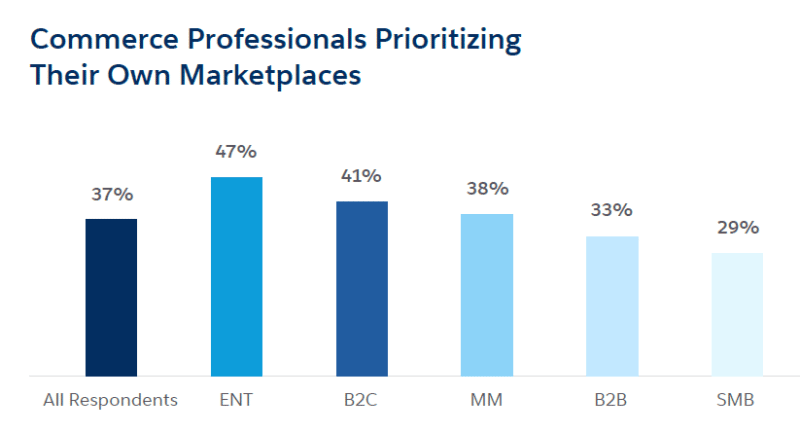B2B firms saw their revenue from digital channels skyrocket in the past two years. These companies say 40% of their revenue now comes from digital channels compared to 28% two years ago, according to Salesforce’s State of Commerce report. That’s a reflection of increased digital order growth as B2B global same-site sales grew 95% over that period.
Read next: How B2B marketers can activate first-party data in their CDP
Three levels. This is just the beginning of a transformation, according to the study, which divided firms by three levels of online competence:
- Leaders: 35%
- Moderates: 55%
- Laggards: 10%
While 31% of all B2B sellers say online channels provide more than half of all revenue today, 57% of leaders think digital will provide more than half of their revenue within the next two years.
Nearly all (97%) digital leaders and moderates (91%) expect buyers to place larger, more complex orders online in the next two years, compared to only 62% of digital laggards. Companies are also prioritizing going direct to customers, with 54% of B2B organizations already selling directly through their websites.
Get the daily newsletter digital marketers rely on.
Experience counts. With 91% of B2B buyers saying purchase experience is as important as products or services, vendors are having to improve their online performance. One way is with marketplace platforms directly connecting buyers and sellers: 33% say launching a marketplace is a priority over the next two years.

Further, B2B companies are responding to the same changes in consumer preferences hitting B2C. When picking between brands, 54% of business buyers prioritize convenience. So, business sellers are adopting flexible fulfillment. 51% of B2B buyers report using curbside pickup more than they did one year ago and 55% expect to be using options like buy-online-pick-up-in-store and fast shipping more within the next three years.
The effect on sales. Across the board, 64% of all B2B sellers reported digital commerce increasing sales team productivity. The companies most likely to report this benefit are digital moderates (70%) and laggards (60%).
Also, 60% of companies say digital commerce improves sales team members’ job satisfaction, with digital leaders 1.4 times more likely than laggards to report this benefit. Similarly, 75% of digital leaders say digital commerce has improved customer satisfaction. B2B companies are also seeing improvement in sales and service relationships: 53% of organizations report this as a benefit overall, although leaders (54%) and moderates (56%) are more likely to agree.
Why we care. B2B and B2C marketing and customer behavior have long been considered entirely separate things. The shift online, driven by pandemic-related behavior changes, is altering that. Hopefully, B2B marketers will be able to learn from what B2C has gone through and not re-invent all those wheels.
























































![Key Metrics for Social Media Marketing [Infographic] Key Metrics for Social Media Marketing [Infographic]](https://www.socialmediatoday.com/imgproxy/nP1lliSbrTbUmhFV6RdAz9qJZFvsstq3IG6orLUMMls/g:ce/rs:fit:770:435/bG9jYWw6Ly8vZGl2ZWltYWdlL3NvY2lhbF9tZWRpYV9yb2lfaW5vZ3JhcGhpYzIucG5n.webp)


















